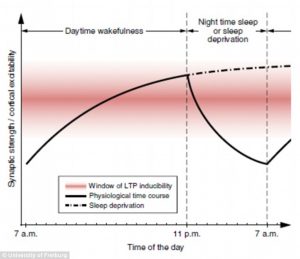
So THAT'S why we sleep: Scientists reveal how hours of shut-eye 'resets' the brain to make room for new memories
Study by University of Freiburg offers first ever imaging of what happens to the brain after a good night's sleep and after sleep deprivation
When we get to the end of the day our brains 'are saturated with things'
The synapses in our brain are 'strong, tense, unable to absorb any more'
Sleep 'wipes those synapses clean to make room for new things'
We all need to sleep.
In fact, we spend a third of our lives unconscious and paralyzed.
But scientists have long been baffled by what happens during this bizarre activity.
According to a new study published on Tuesday, we now know the answer: sleep resets your brain's memory connections, leaving us fresh to make new ones.
At the end of the day, the connections in our brains are tense, saturated with all the conversations, images, and facts we absorbed in our 18 or so hours awake.
Sleep weakens those connections, essentially wiping the brain clean to leave a blank canvas.
Why we sleep: At the end of the day, the connections in our brains are saturated, according to a new study. Sleep weakens those connections, wiping them clean to leave a blank canvas
That is according to the University of Freiburg study led by psychiatrist Christoph Nissen.
It is the first ever study to image brain synapses as affected by sleep.
'The overall strength of connections between neurons increases with time awake, and eventually reaches a level of saturation after prolonged wakefulness or sleep deprivation,' Nissen explains in the study published by Nature Communications.
'Without this synaptic downscaling, the brain loses the capacity to form novel connections, impairing the encoding of novel memories.'
The findings have been hailed as the first concrete explanation of sleep to date, paving the way for practical treatments for insomnia, sleep apnea and mental health disorders that stem of sleeplessness.
To investigate the subject, the team monitored 20 students between 19 and 25 years old, all right-handed non-smokers, free of any mental disorder, drug abuse, or medication use.
In one experiment, the participants had a good night's sleep (of around seven hours) before being screened.
In the next, they stayed awake for 24 hours - playing games, cooking food, but not drinking caffeine - before undergoing the same test.
To screen them, the researchers zapped magnetic waves at the motor cortex - the brain region that controls movement - to trigger a twitch in the left hand.
They found the sleep-deprived participants barely needed any magnetic pulse to trigger a reaction.
Sleep kind of wipes out or cleans up the connections in the brain to enable the novel acquisition of information
That suggests their brain is more 'excitable' than those who are well-rested, and therefore the synpases - which connect brain neurons - are stronger.
Professor Nissen than got the groups to carry out word-pair activities that rely on creating new memories.
In these tests, the sleep-deprived participants fared far worse than their well-rested peers.
It suggests that without sleep the brain's synapses are saturated, tense and strong; filled with all the memories of the day. It makes us tetchy and unable to think clearly.
Just one rough night of sleeplessness, Professor Nissen warns, blocks the brain from resetting, leaving the person foggy, slow and relatively unobservant for the rest of the day.
'Still we do not really know why we spend such a long time of our lives in this inactive state, so sleep must have a very important function,' Nissen explained.
'Otherwise it's just a very big mistake that evolution made.
'Our study highlights the importance of sleep, and the notion that sleep is a highly active brain process, not a waste of time.'
Source: Daily Mail
